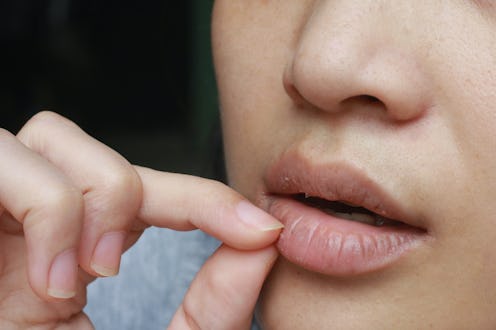Beauty
How To Kick Your Lip-Picking Habit, According To An Expert
Protect your pout.

There are tons of so-called “bad” beauty habits out there, like nail-biting, pimple-popping, and lip-picking, to name just a few. It can be hard to resist squeezing an unsightly whitehead (especially if it’s in a particularly unfortunate spot), chewing on your nails out of boredom or anxiety, or peeling dead skin off your lips, which can be all the more noticeable with lipstick on. It’s when these behaviors become compulsive that it veers into different terrain. Lip-picking, specifically, can be a form of a larger skin-picking disorder — and it’s important to understand the difference between occasionally ridding your pout of a pesky flake of skin and succumbing to a continuous cycle of picking and peeling that leaves you asking, “Why do I pick my lips?”
“While skin-picking is a fairly common phenomenon from time to time in all people, skin-picking disorder is a body-focused, repetitive behavioral problem,” Dr. Evan Rieder, MD, FAAD, a board-certified dermatologist and psychiatrist, tells Bustle over email. “It describes compulsive picking of the skin — and can include the lip — and may co-occur with nail-picking disorder, trichotillomania, and other obsessive-compulsive disorder spectrum diseases.” He adds that it’s characterized by repeated attempts to stop the behavior without success — and accompanying distress.
Whether you’re an occasional lip-chewer or an all-day picker, read on for everything you need to know about lip-picking, including the signs and symptoms, the reasons behind it, and how to stop picking your lips.
Who Deals With Lip-Picking?
The short answer: Anyone. However, it’s most common in people with pre-existing dermatitis (aka irritation) of the lips, explains Rieder. This can occur “from repeated lip-licking or other eczematous dermatitides where the skin barrier is broken and the skin is left red, scaly, and irritated or itchy.” Additionally, he says, people who pick their lips may also deal with other body-focused repetitive behavioral disorders (like skin-picking, hair-pulling, nail-biting, or OCD).
Why Do I Pick My Lips?
There can be lots of internal and external triggers that can make you want to pick your lips, Rieder says, like breaks in the texture of your lip, itching or inflammation, dry skin, and psychological stress. Visibly dry or chapped lips can signal number of things — from a yeast infection to a vitamin deficiency — and some lip products contain ingredients that contribute to chapping and dryness, meaning it’s worth addressing these underlying issues as you work to stop picking your lips.
Psychologically, you may be inclined to pick your lips because of genetics. “There are some family studies which indicate that there may be a genetic component to these behaviors as well,” Rieder says. “Of course, environmental factors, temperament, and stress play a role in who develops such conditions.”
How To Stop Picking Your Lips
There are a few easy lifestyle changes can make it harder for you to pick your lips, according to the TLC Foundation for Body-Focused Repetitive Behaviors, a non-profit that provides support for people living with skin-picking disorders. First off, try keeping your hands occupied so that you can’t idly pick your lips. Knitting, painting, or even flossing can help redirect nervous or anxious energy. Also, upping your vitamin and water intake will also help keep skin healthy and hydrated, reducing the chances of chapped lips that are so easy to pick at. Another hack? Keeping track of your triggers. Try to notice when you pick: What were you thinking or doing at the time? Was there something that made you nervous, anxious, or concerned? Documenting your urges can help you learn when to engage in alternative coping mechanisms, like breathing exercises or journaling.
If you find yourself unable to stop picking your lips, therapy can also help. “During behavioral therapy, people learn to identify and predict their triggers for picking and eventually are able to substitute skin-manipulative behaviors for more productive ones that both extinguish destructive habits and allow the skin to heal,” says Rieder.
If possible, consider telling a close friend or family member that you want to stop picking your lips. Whether it's just through listening or actively stopping you when you're about to pick, support from someone you trust can help. Your pout will thank you.
Studies:
Monzani, B et al. (2012). Prevalence and heritability of skin picking in an adult community sample: a twin study. Am J Med Genet B Neuropsychiatr Genet. https://pubmed.ncbi.nlm.nih.gov/22619132/
Experts:
Dr. Evan Rieder, MD, FAAD, a board-certified psychiatrist and dermatologist at NYU Langone Health
This article was originally published on